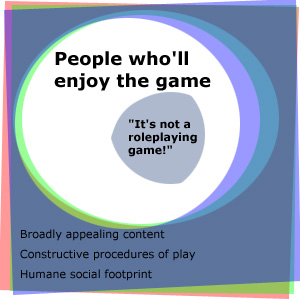2013-08-16 : Diagram Retrospective -plus- Ask a Frequent Question
Been doing this for a while! Here are some of my diagrams from over the years.
from 2005-01-18 : How RPG Rules Work


from 2005-06-07 : Periodic Refresher
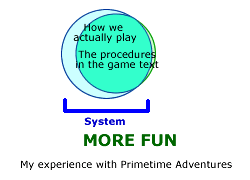
from 2005-10-20 : The Fruitful Void
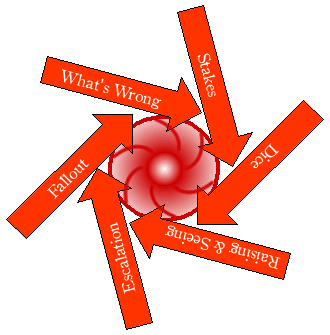
from 2009-04-27 : Dice & Cloud: a Symmetry

from 2010-02-16 : Things on Character Sheets (2)
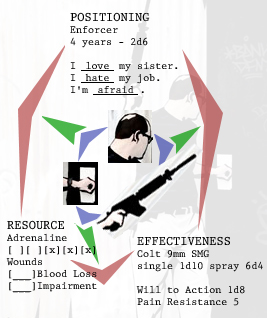
from 2010-11-03 : Horror Flick Pies
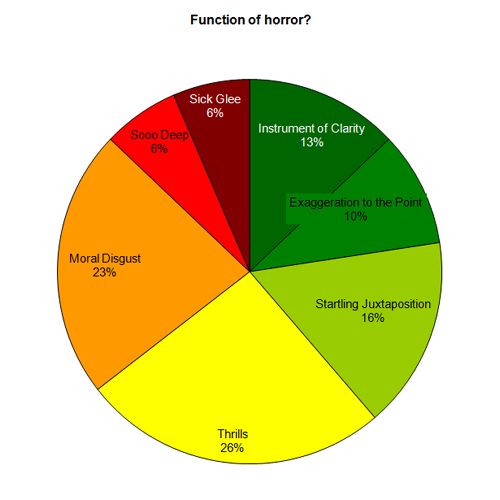
from 2012-11-26 : Positioning: Two Timelines
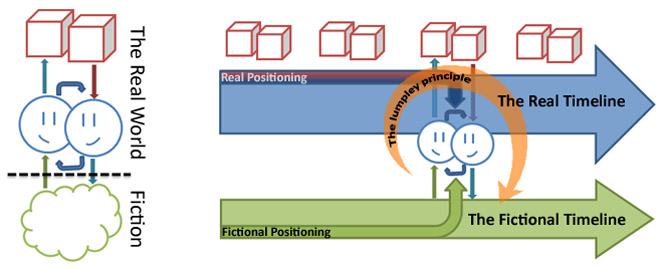
I love to answer questions! If you've got any questions about anything I've ever talked about here on my blog, please feel free to ask them.
1. On 2013-08-16, Nick said:
I was actually just re-reading "Things on Character Sheets (2)" last night, and it got me thinking about currency. If this is free-for-all question time, could I ask you to say a bit about currency in the Sundered Land? (Doomed Pilgrim in particular since that's the only one I have real experience of so far.)
It seems to me that a lot of the gameplay takes place purely in fiction / player-narration, without reference to things-on-character-sheets. Although I see that there can still be currency in that situation, I guess it must be a lot harder to define / quantify. Does that also make it harder to design? How do you think about currency when designing such a game? (Or do you not think about it much at all?)
2. On 2013-08-17, Vincent said:
Nick: Great question! The answer will be a little involved, so give me a bit.
3. On 2013-08-18, David Bowers said:
HI Vincent,
The part that struck my question nerve the most was the character sheet discussion as well. I recently read a post on google+ that got me thinking: are character sheets even really essential to the roleplaying experience anymore? The fact that you don't need them in Sundered Land is one thing, but what about larger scale games? If there is information about the game we need to track, perhaps there are other ways of tracking it that might work better for certain types of games? (i.e. a board, cards, a shared relationship map, etc.)
I got thinking about the categories you wrote about too. Perhaps some games don't even have "effectiveness" and "resource", and function entirely based on positioning... perhaps other games might break down what's important about a character in very different ways, such that resources and effectiveness aren't really in question at all.
I suspect the answer you're working on already addresses these issues and more, but I thought I'd throw this in there anyways.
4. On 2013-08-18, David Bowers said:
Also, since you're not yet flooded with questions here I think maybe I'll ask another.
When it comes to people who will enjoy any given game, how do you think the development of nanogames such as the Sundered Land has contributed to the questions of appealing content, constructive procedures, and humane social footprints? Obviously the time spent to learn (and sometimes play) a nanogame is potentially a lot more humane, but do you think the procedures tend to be more constructive when constrained for brevity as well?
5. On 2013-08-18, Greg Pogor said:
Does the fruitful void mean something else than "give the players procedures that push their characters to the thematic questions you wish to ask through your game, but offer no procedure that answer those questions for them" ?
6. On 2013-08-18, Dan Maruschak said:
Over in this comment thread I suggested refactoring your concepts of positioning, legitimacy, and effectiveness in a way that I thought would be less complex and more analogous to other types of games. Have you had any more thoughts about that?
7. On 2013-08-18, Larry L said:
Thank goodness, you put them all in one place.
You forgot the one about trying to read babies. Oh, that's not game related, I GUESS.
8. On 2013-08-18, Ben Lehman said:
Can I use this thread to ask provocative questions about topics you haven't discussed?
9. On 2013-08-18, Nick said:
Greg: Personally I'd add that the procedures also lead them to invoke other procedures. (Each arrow invokes a new arrow, in the picture.) That way you're not just pushing them to the questions; you're also keeping them there. But that's just my take!
10. On 2013-08-18, Vincent said:
Nick: So yes, exactly, "currency" just means that what happens here, matters there. Since the Doomed Pilgrim looks mostly like this:

...What happens "here" is fictional, and it matters fictionally "there."
There are a couple of pieces of mechanical currency in the Doomed Pilgrim, around the dice. One is where if you've already rolled a 2-5 ("here") and you roll a 2-5 again ("there"), you get to choose a different result.
But to answer your question: nope! Fictional currency is perfectly easy to design into a game. A more sensible name for it would be "cause and effect," and our brains want it so badly that we'll do it without hardly any prompting. When we play and when we design.
11. On 2013-08-18, Vincent said:
David (Q1): Sure. No character sheets, sure.
Also, the categories don't really exist. They're a thought experiment to help us look at game design in the abstract and begin to see the breadth of possibility, when it's useful for us to do that. In no given real game, either finished or at any stage of design, do we need to determine what is a resource and what is effectiveness and whatever.
The rules are real, the categories aren't.
(Q2): It's too soon to tell, but signs point to good.
12. On 2013-08-18, Vincent said:
Greg: That's an awfully specified version of it. Over-specified.
But, sure. Yours is an example of what "fruitful void" means, if it even means anything.
Dan: Since you ask, any categorization is poor, a thought experiment, useless. Refactor if it gives you pleasure but don't expect it to make any difference. The concept of currency is the only part that has any value.
Larry:
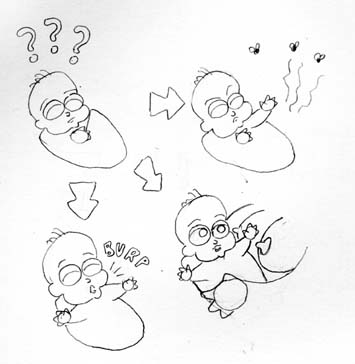
Troubleshooting the Baby
Ben: Use your judgment!
13. On 2013-08-19, Christoph said:
Hi Vincent
Regarding the dice-smilies-cloud diagrams, where would Polaris' key phrases fall? They're not physical cues (although arguably I could point at them in the book or on a cheat sheet), and they're not really part of the fiction, yet they're very formal and procedural and always completed to make a statement about the fiction.
14. On 2013-08-19, David Bowers said:
Hi again :) With reference to the Fruitful Void question above, I find this topic sort of like poetry: very clearly meaningful, but when you try to pinpoint down how exactly it's meaningful, it can get muddy and hard to explain. Has the passage of nearly 8 years since your original post about it changed, refined or clarified your view on this topic at all?
Related to that, what do you think about the fruitful void in games that are more generalized (such as GURPS or FATE), rather than something more specific (such as Mountain Witch)?
15. On 2013-08-22, Josh W said:
At the risk of excruciating (rather than just interesting) self examination, you've made a few games with horror elements now, what would you say they've gone for? (And also, what have you been able to achieve any of the other combinations in other systems?)
16. On 2013-08-26, Vincent said:
Josh W: Great question. Here's what I said about it at the time:
2010-11-08 : What I learned from my horror binge
The idea of the function of horror applies best to horror in play, not in design, so in a lot of ways it's out of my hands. I can't say, like, "the horror in Apocalypse World is an instrument of clarity," because it depends upon you in play. I'm sure that a lot of the time the horror in Apocalypse World is straight-up thrills, or sick glee, or moral disgust, or whatever.
We did have a beautiful moment of horror as an instrument of clarity in the Apocalypse World game Meg ran. A particular horror confronted my hardholder with the falsity of all his assumptions and working principles, revealing to him that the world was not what he understood it to be, that his role in the world was not what he understood it to be, and that if he was to continue to exist he would have to change himself. He was able to do it (by becoming a touchstone).
Oh! Here's an interesting critter. The function of horror in Murderous Ghosts isn't any of these, because the object of Murderous Ghosts isn't a story. I'd have to conduct a whole new binge to try to figure out the functions of horror in non-stories.
17. On 2013-08-26, Vincent said:
Christoph: Polaris' key phrases aren't well-illustrated in the early cloud-smilies-die picture, but they do appear in the Two Timelines picture. See the little U- and upside-down-U-shaped arrows, smiley to smiley? That's where Polaris' key phrases fall.
They're a formal component of the interactions between the players. They're basically the same as things like who's the GM, when someone reminds someone else which dice to roll, whose character is whose, when someone goes on a tangent about real-world historical warfare to get everyone on the same page about what's happening in the fiction, and so on.
This makes...
CB go "okay! Thanks!"
18. On 2013-08-30, Christoph said:
Hello Vincent
I'm grappling a bit with currency. It used to be that people said that currency was "the various relationships within and between effectiveness, resource and positioning, or, more generally, within and between components of character. [...] They?re called ?components of character,? but if something other than a character has them, that?s fine with me."
With the new construction of positioning and effectiveness currency is not explicitly discussed. Applying currency to the Ok-Cycle seems a bit weird, since it's either just plain absent or at best hidden behind the fact that people just say "okay".
But anyway, I still see how I can use the concept of currency as a cue-mediated exchange rate between various components of the game (in any combination of real and fictional time-lines). It lives on another level of analysis, it's more a kind of technique you can apply to game design than a fundamental component of the dynamics present in roleplaying.
The notion of unreliable currency however seems to fall a bit out of use now that we have the notion of fictional positioning. Otherwise we have to say that "being in a car" leading to "driving to North Adams" has something to do with currency (weird, since we're talking about cause and effect more than coins...), which is kind of beside the point. So, should I worry about unreliable currency in this new context or not?
19. On 2013-08-30, Vincent said:
Christoph: When we're talking about cycles of fictional effectiveness, positioning, and resource, as in the okay cycle, "currency" is just another word for "cause and effect."
Positioning (fictional or otherwise, along with Resource and Effectiveness, fictional or otherwise) has value at all ONLY when it has currency.
So, yes, you should. All the biz about how you don't know the legitimacy of your move when you make it is caused by the unreliability of fictional cause and effect, which is to say, the unreliability that fictional things necessarily introduce into currency systems.
Like I say to David and Dan above, currency is the idea that has value here. "Positioning" "effectiveness" and "resource" are just a thought experiment, vague examples we use to explore or illustrate the idea of currency. When you're designing a game, or studying a game to understand it, pay attention to its currency systems and don't spend a single second bothering to categorize its components.
This makes...
CB go "Thank you! To summarize:"*
VB go "It's true, we might as well."
*click in for more
20. On 2013-08-31, Josh W said:
Heh, horror in non-stories. I look forward to seeing some blown lit-minds.
I've clearly spent too long talking to you about games, as I can recognise that story from other examples, that's the "protect the children" dude!
Pulling back from talking about games as providing a kind of horror seems credible to me, it's probably too personal and too easy to shift for not to depend heavily on the players.
On the other hand, I imagine that you can head off certain kinds of horror content in the structure of your game, if you break links they need with randomisation for example, or your interrupt certain dynamics before they can form
(eg. sick glee seems not to get much momentum up if your game tends towards matter-of-factness or requires people to confirm certain procedural facts at a fast pace, which has been helpful when playing 4e with someone who loves theatrically gribbly gore!).
Like I imagine that on a basic level Apocalypse World doesn't really do jump stuff, but does tension really easily. I don't really see it aiming towards any particular direction in terms of your purpose of horror categories.
I get the impression poison'd wiggles across the top of that pie chart like a gieger counter with different groups, but doesn't do much "thrills" or "juxtaposition".
21. On 2013-09-02, Vincent said:
Josh W: Sure. That sounds right enough!
RSS feed: new comments to this thread
This thread is closed to new comments.
home: anyway.
newer thread: 2013-08-18 : Utah Bound
older thread: 2013-08-14 : Fastaval 2014 call for proposals
